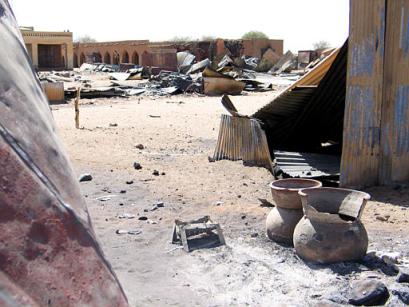Rebels, not government-backed militia, responsible for violence in W. Sudan: officials

By MOHAMED OSMAN, Associated Press Write
BAIDHA, Sudan, April 28, 2004 (AP) — Stung by charges that his government is fomenting ethnic cleansing in western Sudan, the humanitarian affairs minister came to see the evidence for himself looted grain silos, scorched farmland, huts burned to heaps of black clay, and accounts of hundreds of thousands made homeless.
But left unanswered was the question of who is to blame for the tragedy and looming famine in the Iraq-sized province of Darfur the Arab-dominated government in Khartoum, or the rebels it claims are threatening Sudan’s stability with their campaign for autonomy?
The Darfur disaster has emerged as a delicate peace, brokered by Western and African diplomats, is taking root in another of Sudan’s conflict zones a 21-year civil war broadly defined as pitting the Muslim north against the Christian and animist south.
In Darfur, which is almost completely Muslim, the division is between African and Arab.
Human rights groups say the government is giving air support to the Arab tribal militias in Darfur. The government says the tribesmen are defending themselves against autonomy-seeking rebels, but denies aiding them.
The government signed a 45-day cease-fire with the rebels on April 8, and during his visit last week, Hamid appealed to international relief groups to help. Sudanese officials said U.N. human rights investigators who arrived in the country last week would have free access to Darfur.
To Hamid, villagers described fleeing from armed horsemen who burned and looted their homes. They said they didn’t know who the attackers were, but out of the earshot of Hamid’s entourage, an African tribal chief blamed “janajaweed” tribal militias.
The chief, who requested anonymity, did not say whether he believed the government was backing the janajaweed.
Human rights groups accuse the government of bombing villages before janajaweed raids and providing helicopter reconnaissance afterward. New York-based Human Rights Watch calls it “a strategy of ethnic-based murder, rape and forcible displacement of civilians in Darfur.”
Last week it said it had documented dozens of janajaweed attacks supported by government forces. It described an operation in which troops allegedly worked with janajaweed to detain 136 African men whom the militias later massacred.
A U.N. report leaked last week accused Sudanese forces of raping non-Arab women and girls and bombing civilians in what may amount to crimes against humanity.
West Darfur Governor Adam Sulieman has said any atrocities are the work of “bandits, outlaws and rebels.”
In a TV interview last week, Foreign Minister Mustafa Osman Ismail said the janajaweed “took up arms to defend themselves” against rebel attacks.
But while denying the government was backing the janajaweed, he said it “may have turned a blind eye toward the militias … because those militias are targeting the rebellion.”
The rebels accuse the government of neglecting impoverished Darfur, long an arena for clashes between African farmers and Arab herdsmen over grazing areas.
“What started as a tribal conflict turned into something else. In this very area, 70 villages and nomads camps were burned down, an unspecified number of persons killed, some 23 institutions were destroyed, 2,700 pupils and students interrupted their schooling. Now after people have come back, there is little we can offer them,” Hussein Hassan Sharaf, a teacher, said at a public meeting organized for Hamid’s visit in Baidha, near the border with Chad.
Some 70,000 of Baidha’s 78,000 people have fled into Chad. Some who have returned since the cease-fire are in desperate need, local officials said.
“Our request is simple, we want plastic sheets, seeds and food that will take us up to the harvest season,” said Sultan Saad Abdul Rahaman, chief of the Masalit, the second largest African tribe in Darfur.
Visiting the Mukjar area, with a population of 123,000, minister Hamid was told rebels had attacked three times since October, making it impossible to harvest crops.
Some 51,000 people, mostly women, fled to camps around Mukjar, Hamid was told.
“When I came here, I saw women crawling on their knees to pick up grain from the ground,” said Ahmed Sabah Rizzigallah, deputy director of a Kuwaiti organization that was the only foreign aid group working in the area.
